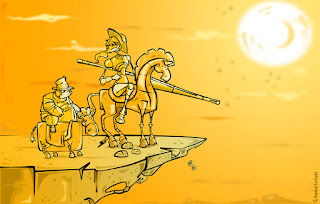In a rather sentimentally
titled article, The
Saddest Trend, The Economist says that more and
more people are committing suicide in the country of “inexorable progress.” From 1999 to 2014, the suicide rates in
America rose by 24%.
The article does not list
any reasons. America is a dream for many
people in the world. So many Asians are
willing to sacrifice their lifetime savings in order to be able to migrate and
live in America, the perceived paradise on earth. America, the land of progress, the land of
dreams, the zenith of human aspirations.
Yet the Americans are choosing to end their lives prematurely! “Men shoot themselves, women take poison,”
tells the article pithily.
Let the reasons be,
whatever they are. We shall wait for
experts to analyse them. In the meanwhile, we may ask ourselves why is India,
our country, leaving no stone unturned in following in the footsteps of this
nation whose people are choosing death over life.
 |
| Don Quixote and Sancho Panza: End of the Road Source: DeviantArt |
We have adopted the
American economic policies and the attendant development dreams lock, stock,
and barrel. Statistical data about
economic growth and per capita income give us orgasmic ecstasies. We have replaced our natural forests with concrete
jungles. We have killed our rivers with
industrial effluents. We have converted
our villages, what the father of the nation called the soul of the country,
into deserts.
But we are marching like
Don Quixote and his most loyal Sancho Panza towards “inexorable progress.”
For what?

The citied article talked about suicide rates in America and other rich countries. According to some other article I read somewhere, people living in middle and lower financial standards are fast leaving big and renowned cities of America and moving towards more economical areas.
ReplyDeleteI think the time is not far when this trend would be followed in all countries including our own India.
It's not only the migrating issue, even for people who choose to stay here itself, we the society have put so much pressure on particular standards of living that many times, people fail to live up to that and end their lives.
As the rich become richer and live more royal lives, the poor will be forced to move out. This is the reverse of what happened during industrialisation: people are now forced to leave the cities. But the countryside or village may not be able to sustain them especially in a country like India.
DeleteWe may look at Bhutan for some lessons. They try to assess the happiness quotient rather than economic statistics. That's a paradigm shift,in fact.
Blame depression, our self-made bubbles where we prefer spending more time with technology than real people, breakup of the great Indian family....
ReplyDeleteBubbles are the most important things. The world runs on bubbles.
DeleteThis post caught my attention because many times I feel that we are blindly aping the west without giving any thoughts. And why are we doing so? partly our colonial mindset...anything emanating from west must be good and partly because of media. Our thoughts are infleunced by what we see and read in any form of media as well as by actions of our circle. For example, currently glass facade buildings are pretty popular. The trend that came in from west. Unfortunately, it might suit their climate and weather but it's not at all conducive for our conditions. But who's going to question this psychology? Similarly we are giving up our culture and mindset to adopt "imported" one! People say that's future....I disagree.
ReplyDeleteMany of our engineers and architects are foreign-educated. Anyway whatever comes from the west is perceived as great. At the same time we have a silly notion of nationalism too. Quite funny we are!
Delete